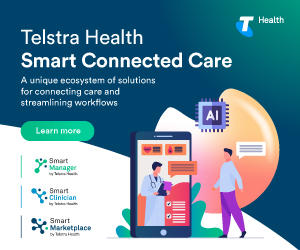Parenting an innovative idea
Does parenting an innovative idea have the same trials and tribulations as parenting children? MedicalDirector’s CEO, Matthew Bardsley, discusses his lessons learnt about nurturing innovation and what ‘success’ can look like.
As an entrepreneur and father of two young children, I’ve started to see a lot of similarities between parenting and nurturing business innovation, and learned a lot of valuable lessons along the way.
The excitement of the early years
The journey and experiences of bringing an innovative idea to life, is very much like parenting – with all its ups and downs. First there’s the conception, and all the excitement around having a great concept. Then there’s the gestation period, and taking the time for the idea to takes shape and grow stronger. During that formative time there’s always trials, tribulations and risks – and times when you even start questioning whether you’re really cut out for the long parenting road ahead.
Then comes the excitement of launching that newborn idea into the world. You get your first start up money, you get your first seed capital. There’s the buzz, the whirlwind of emotion, but your idea is still quite fresh and fragile, and requires a lot of consideration and care. Meanwhile at the back of your mind, you’re still wondering whether you really know what you’re doing.
Nurturing independence
Over the years, you continue to nurture your idea, invest in it, and grow the idea to the point where it can walk and talk, and start to look after itself. Finally, you take the big leap and give it to the first customer. It’s a big, uneasy moment in the stage of any idea or product, where it goes into the customer’s hands, and you lose control of that idea.
It’s like a child having its first day at school. They go down the laneway and then turn around to you and wave, and off they go. And as a parent, you support that growth and journey into the next phase, which are the teenage years.
Now the ‘teenage years’ of a business are often the toughest. There’s a certain level of independence that idea has, but it now needs to be governed by something, all the way through to enterprise. So you need to implement a different form of wisdom and knowledge, while tackling tasks and overcoming obstacles or resistance in new ways.
As you continue to nurture your idea, putting your heart, your soul and energy into every aspect of your idea, your passion and dedication for it deepens and grows. You want, more than anything else, for it to succeed. But at the same time, just like a new parent, you become blinded by its imperfections.
Blinded by the beauty
There’s that old scientific experiment where you ask all parents in a room, ‘put your hand up if you’ve ever seen an ugly baby,’ and everyone puts their hand up. Then you ask the same group if their own baby is ugly, and nobody puts their hand up. Now what this shows is that when it comes to parenting, beauty is really in the eye of the beholder.
Applying this analogy to innovation, while we have a certain vision of what we’ve brought into the world, we see all the beauty and potential in it, we often fall into the trap of being blind to all its failings.
So for every entrepreneurial idea, I always approach it from this parenting analogy. The challenge for any entrepreneur, or visionary who is passionate about their product, is to be able to see the ugliness, as well as the beauty in the idea – because there will always be both.
Having that balanced view requires different perspectives and feedback. In parenting, for instance, it could be teachers and peers. For an idea, it could be your customers. And it’s important to listen actively to have that clearer perspective.
In many ways, like parenting, there’s no real right or wrong – there are certain tools, resources and support groups you can use, but ultimately it’s what works for you and your individual circumstances. Similarly in business, while there are always systems and processes that you can use, ultimately it’s up to you to choose what’s right for your product.
For instance, a medical innovation or product, requires much more rigour – with significant levels of testing, compliance and backups. A disposable mop on the other hand, needs something entirely different. So you need to think about your style of product, and the ‘style of parenting’ it needs to be best supported in the world.
What constitutes failure and success
Now when products fail, like parents of a child that’s performed poorly at school, the innovators often feel guilty, and blame themselves for the failure. There are also many other factors that could contribute to that failure – the environment the product was placed into, perhaps changing dynamics or regulatory requirements.
Malcolm Gladwells’ Outliers examines this issue in detail, discussing what success really means, the time required to achieve it, and the right environment required to make talent thrive. If you’re truly innovative, it doesn’t exist in the psyche of people. When people first see the idea it’s so foreign to them, they don’t understand – or are afraid of the consequences. And we often hear about Gartner’s ‘hype cycle’, where the first wave of technological innovation is the ‘hype curve.’ People who parented an idea in that wave, developed an idea in a market that wasn’t quite ready.
But after that comes the ‘slope of enlightenment’, when people are more familiar with the concept and are more open to adoption. Innovators who develop ideas in this next phase, where it’s more aligned to the market needs, have a greater chance of success.
Look at Tesla’s electric car. The first electric car launched about 12 years ago, it was this bespoke roadster, that extreme innovators adopted and people looked at with suspicion, or dismissed as unattainable or impractical. But now, it has becoming more mainstream – because the idea is talked about more widely in society.
So as you embark on the brave journey of parenting your innovation you don’t have to go far to look for inspiration to get you through the late nights, tantrums, talking back, getting home after curfew, breaking up with their partners, marrying and finally finding their grove in the world…. just ask your parents how they did it!









